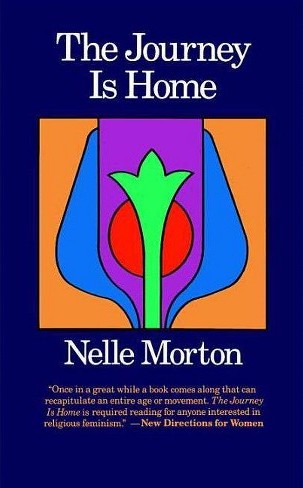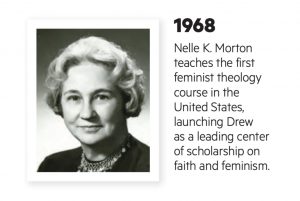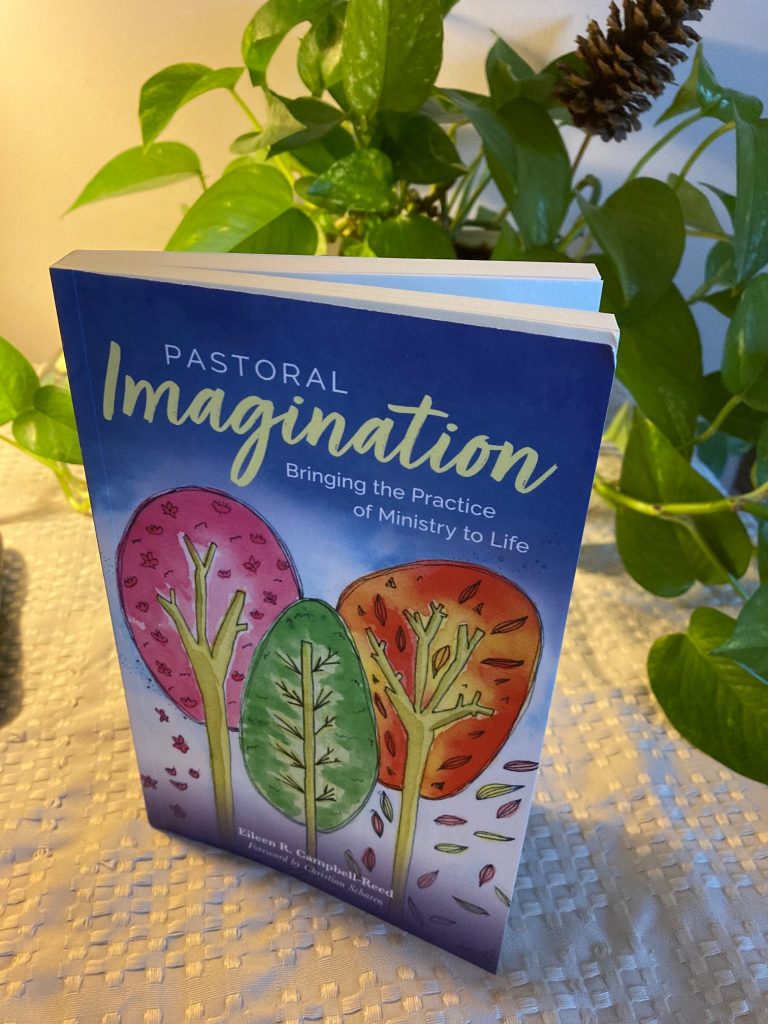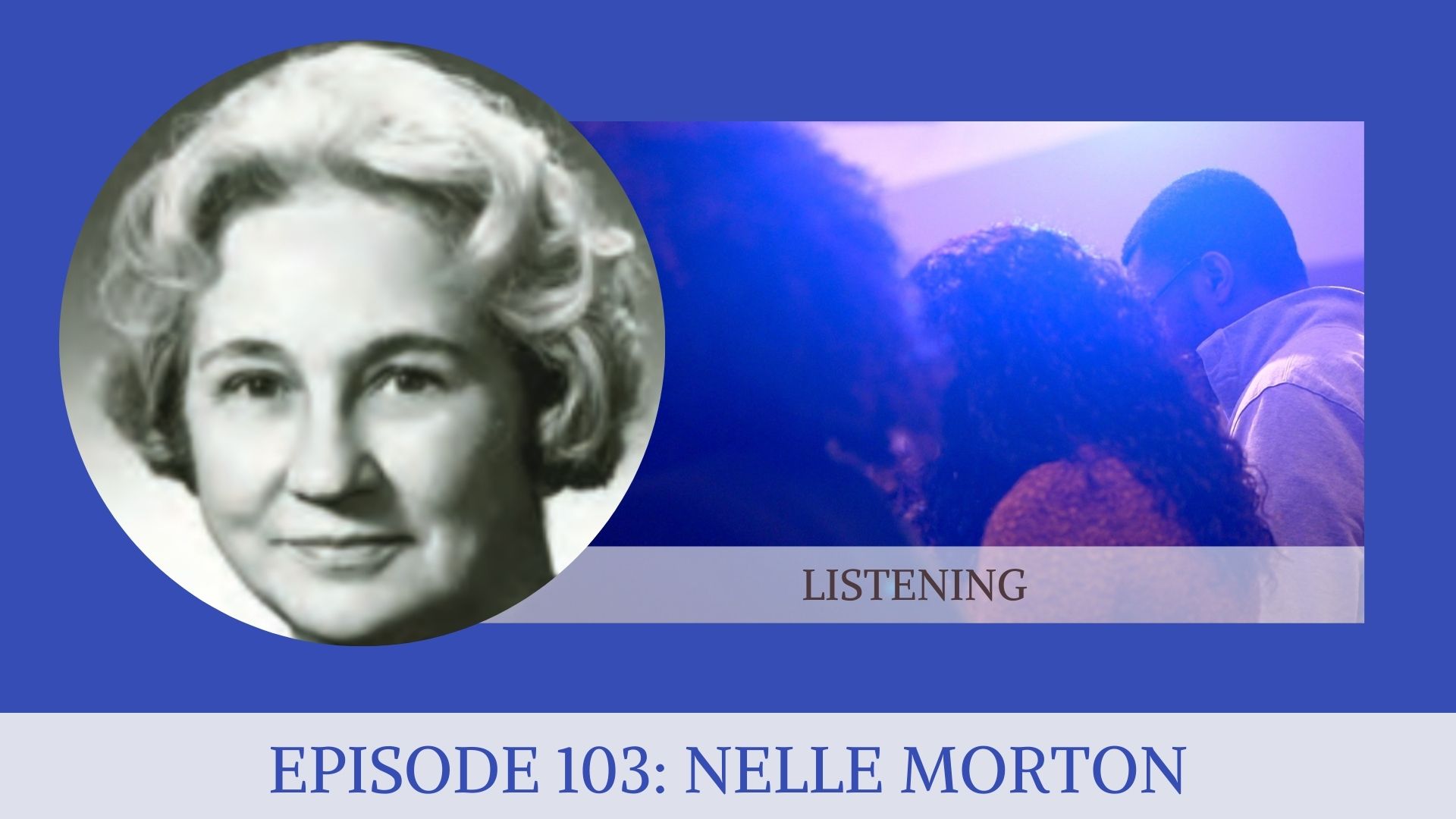Has the Spirit been speaking to you in the course of this pandemic year? Where? How? Through whom or what?
The past year has been quiet in some ways, making listening easier as many of us work from home. We go out less. We don’t enter crowds as often.
Yet the year was also extremely culturally noisy. Hearing the voice of the Spirit through the din of news, competing ideas, and feelings of anxiety, fear, grief and loss is quite challenging. Even hearing each other “all the way” to the depths of our souls in these pandemic times has been really hard.
Theologian Nelle Morton (1905-1987)

I first encountered the idea of “hearing someone all the way” from feminist theologian Nelle Morton. Morton, taught on the faculty at Drew University School of Theology (1956-71). She was among the earliest theological educators to embrace feminism in the seminary classroom. She taught her first course on “women, theology and language” at Drew in 1968 (Journey, p. xx). The course was titled, “Women in Church and Society.” It captured Morton’s “growing awareness and anger over the position and treatment of women in the culture and the church’s role in discriminating against women’s leadership,” according to Christian educator and author of a short biography of Morton, Elizabeth F. Caldwell.
We draw on the work of Nelle Morton when we set the stage for each interview in the Learning Pastoral Imagination Project. My research partner Chris Scharen likes to invoke Morton when he and I set the stage for an interview day. We need to allow each other room to reach for the words. We need to listen with our whole selves. And we are asking our study participants to embrace the work of “hearing others to speech.”
We not only put listening at the center of our research, but silence itself stands at the core of our research project. Do you want to know more about the role of silence in our ethnographic interviewing? Please write to me in the comments and I will send a copy of our article “Ethnography on Holy Ground“ to you.
Listening
Listening is key to the work of cultivating pastoral imagination for the practice of ministry. Good relational listening, as spiritual director, Julie Merritt Lee said recently, is not just “reloading” while waiting your turn to say something. The kind of listening that makes a difference in our lives and ministries is deeply rooted and grounded in silence.
I think of silence as the ground of all of my life and work. I think of it as the very language of God. Teaching, theological beliefs and practice, relationships, research, worship, and living itself are rooted in this sacred silence. For me, this is not a silence of absence, but rather a silence of profound and holy presence.
Nelle Morton imagines hearing one another in this profound way as a kind of empowerment. She believes the power of hearing one another is strong enough to re-imagine the systems of our lives. Hearing of this profound kind is, “A great ear at the heart of the universe –at the heart of our common life—hearing human beings to speech—to our own speech.”
Listening builds trust. It opens up a sense of belonging through being seen and heard. Silence makes a way to welcome each other into a fuller embodied and relational presence that takes us beyond the limits of the moment. Over time it builds what one mentor and student call a “circle of sisterhood.” Hear the story of how listening builds that level of trust in this week’s video.
Be sure to check out the new closed captioning [CC] option on each weekly video!
More on Listening: video | blog | podcast
Learning in Practice with Nelle Morton

When I decided this week to delve into a what we could learn from a historical figure, I felt energized. Everything in this season seems to be: Now! Headline News! What’s the latest?! “Spill the tea!”
To listen to an earlier life and perspective feels refreshing to me in some mysterious way. Clearly Nelle Morton has so much to offer about the power of listening. In my exploration this week I also discovered recent blogs, oral histories from 35 years ago, books I didn’t know existed, and many connecting points.
I encourage you to learn more about Nelle Morton in this excellent brief biography by Elizabeth Caldwell. For myself, I’m going to offer a couple of appreciations and connecting points between Morton’s life and my own.
Ministry, Teaching, Activism
First, I appreciate that Morton was born and grew up and returned to work in East Tennessee. My early life unfolded in that region also. She did a variety of kinds of work in church ministry as well as teaching, activism and organizing in the Tri-Cities. Morton also lived and worked in many other places. She committed herself to integrating a racially segregated South as early as the 1930s and 40s. Morton advocated for children with disabilities. Much of her labor in collaboration, organizing, challenging laws and social norms, contributed to the groundwork which became the Civil Rights Movement of the 1960s.
There was no language for “intersectional feminism,” in the decades when Morton was doing her work. She was among the first wave of feminists. Yet her lifelong commitment to justice in all these different sectors, inspires me to keep working on multiple fronts to change and reimagine the world. It encourages me to keep making partnerships and commit to following the lead of Black and Brown and Indigenous Peoples working for justice.
Morton’s decades of investment in multiple kinds of justice work reminds me how enormous the problems are. It also reminds me how long the labors for change have been going.
While she spent more than a decade teaching at Drew, Morton was also a visiting professor at Union Theological Seminary (New York). This was also a happy surprise for me to discover.
Theology in Practice
Secondly, I appreciate that Morton was both a Presbyterian minister and seminary professor. She ministered and taught in various settings for sixty years. She was deeply frustrated with the church at times. Yet early in her career she was a denominational employee for the Presbyterians. And later she became the General Secretary of the Fellowship of Southern Churchmen (1945-1949). The Fellowship was an “inter-racial and multi-faith organization” seeking to challenge the segregation laws and usher in change. Morton came to see just how flawed the patriarchal structures of the church are and how much re-envisioning the church needed to be viable and just.
Not only was her career a mix of ministry, teaching an activism, she also wove threads or themes into her work that resonate for me. Morton grounds much of her theology in The Journey is Home in her work of participating and also facilitating small groups of women.
She brought women together. And she led them through a process that allowed them to hear one another. She did it collaboratively as feminist values would insist (Journey, pp. 201-06). This connects for me to the work I do in teaching and research. In each setting, I believe that facilitation of process is on par with the significance of content that is shared.
This week the Spirit is speaking to me through life and work and theology of Nelle Morton. I have appreciated her for a long time, yet I’m now considering her to be among my foremothers. I never met her, yet she is one of many who inspires hope in me. She paved the way for my own ministry and teaching. Decades before I was born she was embodying commitments to justice and reimagining a world with room for everyone.
+++++++

Listening is a crucial aspect of cultivating a pastoral imagination. And pastoral imagination is that which allows one to fully embrace the embodied, relational and spiritual character of the practice of ministry. To learn more about how pastoral imagination is cultivated over time, see Eileen Campbell-Reed’s new book Pastoral Imagination: Bringing the Practice of Ministry to Life.
“Listening” is one of fifty chapters in Pastoral Imagination (Fortress Press, May 11). Pre-order yours today!
We are working on a special opportunity for you to order both Pastoral Imagination and its companion journal. Announcement coming soon!
Want to see all fifty videos that prepared the way for Eileen’s new book? Here they are! Enjoy.




